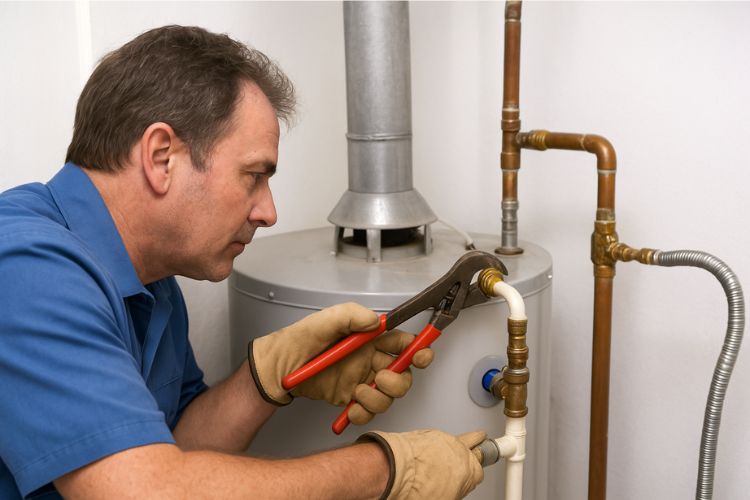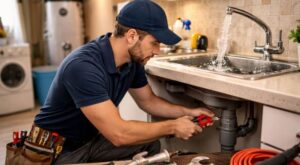Ever stepped into the shower expecting steaming hot water, only to be greeted by an icy blast? That frustrating moment is when most homeowners realize just how essential their water heater truly is. Learning how to fix water heater issues not only saves money but also helps prevent small hiccups from turning into costly emergencies.
Why Water Heater Repair Deserves Your Attention
The water heater is one of those “silent workhorses” of a home—always running in the background, rarely noticed until something goes wrong. Whether it’s a lukewarm shower, strange noises, or a sudden leak, timely repair can save both money and stress. In fact, according to the U.S. Department of Energy, heating water makes up about 18% of household energy use, making efficiency and maintenance doubly important.
Also Read: Why is Your Home’s Water Pressure Low? Discover the Causes
Common Water Heater Problems (and Their Causes)
Before diving into repairs, it helps to know what you’re dealing with. Most issues fall into a handful of categories:
- No hot water: Could be a tripped breaker, faulty thermostat, or broken heating element.
- Water is too hot or too cold: Typically points to a thermostat issue.
- Strange noises: Mineral buildup at the bottom of the tank causing popping or rumbling sounds.
- Leaks: A sign of loose connections, failing valves, or—worst case—tank corrosion.
DIY Water Heater Troubleshooting Steps
Not every issue requires calling a technician immediately. Here are a few safe checks homeowners can perform:
- Check the power or gas supply—sometimes the fix is as simple as resetting a breaker or relighting a pilot light.
- Inspect thermostat settings—make sure it’s set between 120°F and 140°F for optimal performance.
- Drain a few gallons—flushing sediment can improve efficiency and silence those strange noises.
- Look for visible leaks—tighten loose connections, but leave tank damage to the pros.
When to Call in the Pros
If troubleshooting doesn’t solve the issue, it’s time to get professional help. Serious leaks, electrical failures, or full heating element replacements are best handled by experts. And here’s a tip—if your water heater is older than 8–12 years, frequent problems may signal it’s time for a replacement rather than another patch-up job. This is where knowing a trusted provider of the Best Plumbing Services in Dubai makes all the difference.
Why Preventive Maintenance Pays Off
Regular maintenance keeps your water heater running efficiently and extends its lifespan. A quick annual check-up—flushing the tank, inspecting the anode rod, and checking pressure valves—can save you from unexpected cold showers. Think of it like servicing your car: a little effort upfront avoids bigger, more expensive problems later.
How Water Heater Repair Connects to Overall Home Comfort
It’s easy to overlook, but your water heater connects to the comfort of your entire home. For example, proper water heating complements climate control systems—if your plumbing is efficient, your HVAC doesn’t have to overcompensate. That’s why many homeowners schedule plumbing checks alongside AC Service Dubai, ensuring every system works in harmony.
Pro Tips for Homeowners
From years of homeowner stories and technician advice, here are a few tried-and-true pointers:
- Label your water heater’s breaker in the panel box—saves time during emergencies.
- Install a leak detector under the tank—early alerts can prevent water damage.
- Consider insulating your water heater tank and pipes—helps cut down on heat loss and utility bills.
FAQs on Water Heater Repair
1. How often should I flush my water heater?
Experts recommend flushing once a year to remove sediment and maintain efficiency, though hard water areas may require more frequent flushing.
2. Why does my water heater make banging noises?
This is usually caused by sediment buildup at the bottom of the tank. When water boils under the sediment, it creates popping or banging sounds.
3. Can I repair a leaking water heater tank?
Small leaks from valves or connections can often be fixed, but if the tank itself is corroding, replacement is the only safe option.
4. What’s the average lifespan of a water heater?
Most units last 8–12 years with proper care. Beyond that, repairs may become more frequent and less cost-effective.
Final Thoughts
Your water heater may not be glamorous, but it’s vital for everyday comfort. Understanding the basics of repair and maintenance empowers homeowners to act fast, save money, and avoid chilly surprises. With the right mix of DIY awareness and professional support, you can keep hot water flowing smoothly year-round.
Also Read: The Ultimate Guide to Water Pump Repair Services in Dubai
Blog Development Credits
This blog was a team effort fueled by smart ideas. Soumyajit Sardar picked the topic. Most content was crafted using tools like ChatGPT and Google Gemini. The Digital Piloto team polished and optimized the blog to ensure it’s clear, engaging, and SEO-friendly.




